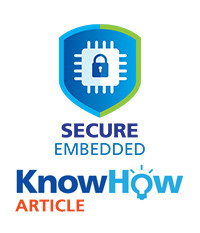Introduction to Security
Why is security necessary • Regulatory Requirements • Vulnerabilities, Threats and Attacks • CVE and CWE • Embedded System Security Terminology • Security By Design • Embedded Security Frameworks • Arm PSA • PSA Security Model Goals • Overview of Secure Software Development Lifecycle
Hardware Vulnerabilities for C Code
Safe use of pointers • Memory allocation and corruption • Return Oriented Programming • Buffer overflow
Writing Secure C/C++ Code
String and format functions • Avoiding Buffer Overflow • Side Channel Timing Vulnerability • Integer security • Concurrency • TOCTOU • File I/O • Error Handling • Lab - Memory Overflow-based attacks
Secure Software Development Lifecycle
Secure Software Development Lifecycle and Processes • Business Requirements • Maturity Models • Threat modelling • STRIDE • Risk Analysis and Assessment • Common Vulnerability Scoring System • Attack Trees • Arm PSA Framework • Common Criteria • PSA Analysis Phase • Target of Evaluation • PSA Protection Profile • Security Functional Requirements • Platform Security Considerations • Lab – Creating a Threat Model
Introduction to Cryptography
Encryption and Decryption • Cryptographer's Threat Model • Shift Cipher • One-time Pad • Random Number Generators • Data Encryption Strategies
Symmetric Cryptography
Block Cipher Modes • Electronic Codebook Mode •Cipher Block Chaining Mode • Output Feedback Mode • Cipher Feedback Mode • Counter Mode • ChaCha20 • Padding Oracle Attack • Hash Functions • Message Authenticity & Integrity • HMAC & KMAC • AEAD Ciphers • Performance Comparisons
Lab - Message encryption/decryption
Cryptography in Action
Asymmetric Cryptography •RSA Operation • RSA and Diffie Hellman Key Exchange• Elliptic Curve DH • Key Derivation Function • Signatures • RSA Signature • PKCS #1 RSA Key • ECDSA and EdDSA Signatures • Attestation with Signatures • Certificate Signing and Verification • Trusted Domain • Certificate Revocation • Software Provisioning • OpenSSL Commands • PKCS Standards
Lab - Installing and using certificates
Transport Layer Security
Secure communications • Zero Trust Architecture • Transport Layer • IoT Protocol Stacks • MQTT • Secure Socket Layer • Transport Layer Security(TLS) • TLS Cipher Suites • Starting TLS 1.2 Session • TLS 1.3 Handshake • TLS Record Protocol • TLS in C/C++ Applications • Wireless Local Area Networks • Wi-Fi Handshaking • Wi-Fi Security Threats • Wi-Fi Protocols • Lab – Configuring TLS sockets for secure communications
Rules for Secure Coding
Vulnerability Management • CWE • Coding Standards • CERT C and MISRA-C • Rules and Recommendations • Risk Assessment • Other Coding Standards • Static Analysis • Lab – Detecting security vulnerabilities with static analysis tools
Secure Embedded System Software Architecture
Secure software architecture goals • Traditional guiding principles • Least privilege, trust and secure processes • Side channel & timing attacks • Double HMAC • Security though Isolation • Cortex-M Modes and Privilege • Run-Time Isolation with MPU • Microcontainer Isolation • TrustZone-M • Arm Platform Security Architecture (PSA) • Trusted Boot and Firmware Update • PSA Firmware Framework • PSA APIs • Trusted Firmware-M
Lab – Performing a side-channel timing attack
Secure Embedded System Hardware Architecture
Security Requirements • Unique ID • Secure Storage • Secure Storage Lifetime • Random Number Generators • Hardware Crypto Engine • Hardware Root-of-Trust • Attestation • Secure boot and update • Memory Isolation and Protection • TrustZone SAU and IDAU • Other HW Recommendations • Secure Elements • Trusted Platform Module (TPM) • Integrated Hardware Security Module (HSM) • Physical Unclonable Function (PUF) • Secure MCU Architecture • Cortex-M and TrustZone
Standards, Testing and Provisioning
Standards and Regulations • EU Cyber Resilience Act (CRA) • Security Regulation Compliance • ETSI EN 303 645 • Other Security Standards • SESIP – EN 17927 • PSA Certified • Security Testing Approaches • Unit Tests • Security Testing Tools • Penetration Testing • Disassembly • Protocol Fuzzing • Side Channel Power Analysis • Secure Provisioning Process




